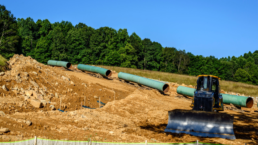By Ken Ward Jr. and Alexa Beyer, Mountain State Spotlight
From his Summers County, West Virginia, farmhouse, Mark Jarrell can see the Greenbrier River and, beyond it, the ridge that marks the Virginia border. Jarrell moved here nearly 20 years ago for peace and quiet. But the last few years have been anything but serene, as he and his neighbors have fought against the construction of a huge natural gas pipeline.

Jarrell and many others along the path of the partially finished Mountain Valley Pipeline through West Virginia and Virginia fear that it may contaminate rural streams and cause erosion or even landslides. By filing lawsuits over the potential impacts on water, endangered species and public forests, they have exposed flaws in the project’s permit applications and pushed its completion well beyond the original target of 2018. The delays have helped balloon the pipeline’s cost from the original estimate of $3.5 billion to $6.6 billion.
But now, in the name of combating climate change, the administration of President Joe Biden and the Democratic leadership in Congress are poised to vanquish Jarrell and other pipeline opponents. For months, the nation has wondered what price Democratic West Virginia Sen. Joe Manchin would extract to allow a major climate change bill. Part of that price turns out to be clearing the way for the Mountain Valley Pipeline.
“It’s a hard pill to swallow,” said Jarrell, a former golf course manager who has devoted much of his retirement to writing protest letters, filing complaints with regulatory agencies and attending public hearings about the pipeline. “We’re once again a sacrifice zone.”
Recent Posts
‘Unconstitutional. Unethical. Authoritarian.’ ICE Bars Millions Of Immigrants From Bond Hearings
July 18, 2025
Take Action Now One watchdog said the new policy “seems like a blatant attempt to stop them from exercising their right to due process.”……
Americans Are Not Nearly Alarmed Enough About Climate Change
July 18, 2025
Take Action Now Americans still don’t comprehend how imminent, dangerous, and far-reaching the threat is—and journalists are partly to blame.By…
The IRS Is Building A Vast System To Share Millions Of Taxpayers’ Data With ICE
July 17, 2025
Take Action Now ProPublica has obtained the blueprint for the Trump administration’s unprecedented plan to turn over IRS records to Homeland Security…
Israel’s Sudden Assault On Syria Is Unchecked Aggression
July 17, 2025
Take Action Now Jerusalem is bombing Damascus and threatening al-Sharaa’s rule, while Washington was hoping to help the nascent government on…




